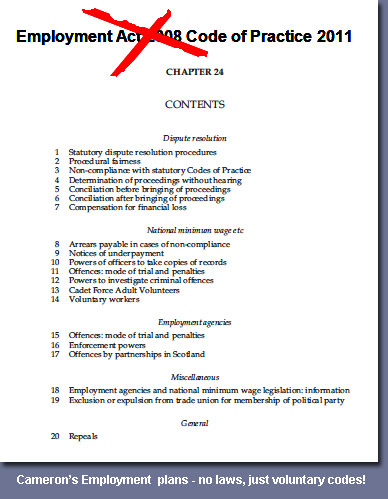Employment Law Under Attack By Government's Red Tape Challenge
In a week when the CBI called for the abolition of all employment law, to be replaced with codes of practice, the Con-Dem(ned) coalition’s Red Tape Challenge is happily going about its business of now defaming Employment Law, with many comments calling for the abolition of employment protection.
 In a section entitled with the wonderfully insulting American phrase of ‘Letting People Go’, - in other words sacking people – some of the most extreme views are being aired.
In a section entitled with the wonderfully insulting American phrase of ‘Letting People Go’, - in other words sacking people – some of the most extreme views are being aired.
Furthermore, Business Secretary Vince Cable has made it clear that the opportunity to abolish Employment legislation will be extended to 25 more sectors, by this summer.
Don't think that the red tape challenge website is merely a political publicity exercise! Vince Cable has stated clearly that: "Where businesses highlight concerns, Whitehall officials will have to make the case to retain the rules or they will be abolished."
British business clearly sees that employment means selling ones soul to the employer who then has the right to hire and fire at will without recourse to justice by the employee should be the norm in the new Big Society. In other words, bring in American employment practices that provide little protection to employees.
The written media this week reported on the fact that the CBI and other business leaders have urged the Government to “fundamentally rethink” its approach to employment law to foster better relations in the workplace.
The CBI claims job losses in private firms have been minimised during the recession because of good communication and “flexibility” between employers and staff. No mention being made of trade union involvement in resolving employment issues.
The CBI have also stated that ministers should build on this by producing codes of practice or guidance in place of existing employment laws, with this approach being also applied to European Union directives, which drive much of the UK’s employment legislation, they claim.
Helping to write the CBI report recruitment firm Hays chief executive Alistair Cox, whose firm derives profits partly from paying less than the rate of the job to temporary workers for the first three months of employment, is quoted as saying:
"Endless red tape and legislation prevents employers and employees from being able to capitalise on the vast number of benefits that flexible working offers. It is time these constraints are removed so that we can get more people into worthwhile work," he said.
Chris Ingram, editor of Unionsafety, had his own experience of Hays’ employment practices as a Liverpool CWU Branch officer. He said:
“In my experience, they were found wanting both in terms of management style and knowledge of good employment practices; but also in their ability to treat their employees fairly and even pay them on time!”
 He continued:
He continued:
“ Those few good Hays managers were frustrated by a culture within the organisation, which quite frankly bullied their employees, and made things up as they went along.”
"Clearly flexible working means being able to higher and fire at will to both Alistair Cox and the CBI.", he concluded
Whilst the Red Tape Challenge has been busy slagging off health and safety legislation and practice, employment law which in many ways compliments health and safety legislation, is coming in for a call for abolition, not only from the CBI and FSB, but even those expected to be more sympathetic toward the need for employment protection.
One such comment was made by an S Henderson, an employment lawyer for over 10 years, on the Red Tape Challenge website section of Employment Law:
“In my view, unfair dismissal laws should be repealed and replaced with a severance pay plan system. Employers would be able to adopt their own schemes, as long as they were not discriminatory in any of the unlawful ways and complied with a statutory minimum level of compensation. This should be service-related and probably equate to around 1 month’s pay (indexed-average over the duration of the employment) for each complete year of service.”
He continues:
“The statutory redundancy payment should also be removed as there would no longer be a good reason to elevate it financially above any of the other reasons for dismissal. Doing this would prevent people from bringing tribunal claims merely for the purpose of showing whose fault the dismissal was. Under the current system, too many redundancies are shams, where selection criteria have been manipulated to remove underperformers or those whose face doesn’t fit.”
He explains further:
“This solution removes the bureaucracy of disciplinary, redundancy and performance management procedures. It is built on the recognition that the employment relationship is a relationship and that, where it breaks down, there is usually some degree of fault on both sides and it is not worth society’s while to create an expensive process to allow people to squabble over who was more at fault.
Most people will lose their job at some point in their career and it is right in most cases that they should receive compensation but it is not in either employer’s or employee’s interests to have to argue expensively over the precise reason(s) for it and whether the employer acted reasonably in treating that as a sufficient reason for dismissal.”
You can read the full offering of employment law enlightenment here
Don’t’ forget to add your own comments in response, as there appears a totally unbalanced argument currently going on in support of abolition of employment protection laws. Source: Red Tape Challenge / CBI / TUC



 He continued:
He continued: